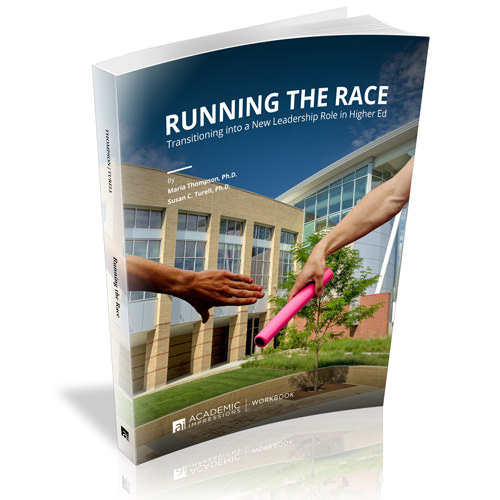A Guide to Using Shared Governance to Work Through the Twists and Turns of Higher-Education Relationships
Order 10+ copies and receive a $15 discount on every copy you purchase.
Books are shipped within 7 days of receipt of payment.
$75.00
by Susan C. Turell, Ph.D and Maria Thompson, Ph.D.
Drama. Passion. Drops. Kicks. Twirls. Slow movements. Quick movements. Sudden changes in direction. These words can be used to describe both the Tango and shared governance. When well executed, both the Tango and shared governance demonstrate the power of partnership and its ability to create a functional, cohesive whole from separate parties. When poorly executed, dysfunctional, arrhythmic outcomes can be the result—the consequence of failed communication and a lack of synchronized effort.
The breathtaking beauty of the Tango is created by each dancer executing different dance moves simultaneously. Like shared governance, the Tango consists of those who lead and those who follow. There is beauty and skill involved in both leading and following, and each dancer depends on the other. Neither role is considered better than the other. The same holds for shared governance.
Susan C. Turell and Maria Thompson’s Tango for Beginners will guide you through the “dance steps” of shared governance, helping you work through the steps that will contribute to working together to challenge existing assumptions about shared governance, communicate effectively, address structural issues, and manage the urgency or the “tempo” of shared governance decision making. The workbook also includes almost two dozen detailed case studies, allowing you to explore various issues that may arise in a shared governance environment. Using these as low-stakes activities as a catalyst for discussion with your colleagues can help to build relationships, uncover assumptions, build some shared understandings, and aid in communications among constituencies.
Early Reviews
“This book will be very helpful to college and university leaders who want to gain a better understanding of the meaning and role of shared governance in higher education. The authors’ masterful use of dance as a metaphor is an effective approach to illustrating the importance of shared governance in leading an institution. The case studies will be especially helpful to the reader in stimulating productive discussions about critical aspects of leadership.”
— Freeman A. Hrabowski, III, President Emeritus, UMBC
“Tango for Beginners captures the importance of trust, communication, and understanding the role each of us plays to effectively develop, sustain, and ultimately use shared governance in the increasingly complex landscape of higher education. Dr. Turell and Dr. Thompson have written a useful and timely workbook for beginners as well as a reminder for experienced academics of the importance of collaboration, transparency, and data-informed strategy setting within our institutions… The case studies provide an engaging opportunity to distance oneself from a current setting and perhaps recognize ourselves and our situations in a new light to work for the common good.”
— Mary Strey, VPAA and Dean of Faculty, Central College
“In Tango for Beginners, Turell and Thompson offer a powerful and fascinating guide to engaging higher education’s most complex issue: shared governance. So aptly titled, the book is about the communication and relationship dance in the life of the academy by all stakeholders, which is so necessary to advance institutional mission and strategic priorities. [Readers are addressed] in a language that is thoughtful and insightful and that resonates with our common experiences as learners, teachers, scholars, advocates, activists, and administrators. Shared governance is not the enemy. Shared governance is a friend when managed well.”
“Tango for Beginners is a must-read for all of us in higher education who are deeply committed to the service of our institutions and the public good.”
— Peter O. Nwosu, Ph.D. Professor of Communication Studies and President, State University of New York (SUNY) at Oswego, New York
About the Authors
Susan C. Turell, Ph.D.
In higher education for 30 years, Susan brings a passion to her work for supporting people and designing and implementing effective processes, all striving toward an equity-minded perspective. Her goal is to synthesize best practices and approaches to help shift 21st-century higher education toward becoming equitable and inclusive.
Prior to serving in higher education administration, Susan taught with an equity-minded pedagogy for 16 years in women’s studies and psychology. She has been actively committed to anti-racism systemic change in the academy for over a decade. Decades of reflection, training, and application have all laid the foundation for her ongoing commitment to working with others to create institutional-level change toward equity and inclusion, via an anti-racism lens. In addition to coaching, she has worked closely with Academic Impressions and her colleague, Maria Thompson, to develop and provide equity and inclusion-focused programming for historically marginalized job candidates and leadership development for all who wish to grow their ability to be more equitable and inclusive.
She has served in leadership as a department chair, associate provost, dean, and provost. Her portfolios have included not only academic colleges and departments, but also key areas that overlap with student success. A seasoned administrator who is a teacher at heart, Susan welcomes the opportunity to share her learnings with new and aspiring leaders—particularly those who are historically marginalized, as well as all those who want to move into positions in which they can influence institutional-level change toward equity. She is committed to helping everyone to find a good fit—to attain positions that will allow them to thrive, encourage their optimism, and support their vision for new possibilities.
Maria Thompson, Ph.D.
Maria is a career educator whose work experience spans a variety of institutional categories, including research universities, comprehensive universities, land-grant universities, and urban-located and rural-located, HBCUs, and PWIs. She served as President and CEO of Coppin State University (CSU) and was the first woman to be installed as president. Prior to her appointment at CSU, she was Provost and Vice President for Academic Affairs at the State University of New York (SUNY) at Oneonta—the first African American in the role. She served as Vice President for Research and Sponsored Programs at Tennessee State University (TSU)—the first woman to serve as chief research officer at the institution. She served as principal investigator on numerous grants and received millions in federal funding for scientific research, facilities construction, and educational projects from the National Science Foundation, the National Institutes of Health, the Air Force Office of Scientific Research, the Department of Energy, and the National Geospatial-Intelligence Agency.
She brings insights to her coaching practice gained through firsthand knowledge from breaking barriers in leadership roles in higher education. She is an experienced coach who works with clients who aspire to be deans, vice presidents, provosts, and presidents. In addition to coaching, she has worked closely with Academic Impressions alongside her colleague, Susan Turell, to develop and provide equity and inclusion-focused programming for historically marginalized job candidates and leadership development for all who wish to grow their ability to be more equitable and inclusive.
During her 30-year career, Maria has focused on developing sustainable, institution-wide strategic and tactical plans to attract and retain historically marginalized faculty and students, with an emphasis on creating opportunities for them to participate in research. She has led efforts that supported faculty in submitting proposals for external funding, publishing in peer-reviewed journals, and participating in research development activities. Recognizing that traditional student success metrics penalize campuses that serve significant numbers of historically marginalized students, she is an advocate for more equitable student success metrics.
She earned a Bachelor of Science from Tennessee State University, a Master of Science from The Ohio State University, and a doctorate from the University of Tennessee.
More Books from Academic Impressions
Running the Race: Transitioning into a New Leadership Role in Higher Ed by Maria Thompson, Ph.D. and Susan C. Turell, Ph.D.
Courageous Gardening: Equity-Minded Leadership in Higher Education by Susan C. Turell, Ph.D. and Maria Thompson, Ph.D.
Perfect Match: A Step-by-Step Guide to Landing a Leadership Position in Higher Education by Maria Thompson, Ph.D. and Susan C. Turell, Ph.D.





